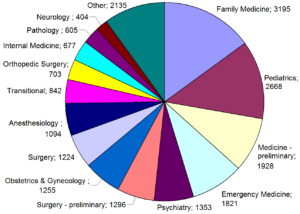September 27th, 2016
Interview Season
Joseph Cooper, MD

Joseph Cooper, MD, is a Chief Resident in Internal Medicine at Geisinger Medical Center in Danville, Pennsylvania.
It’s that time again — time to dust off your nicest suit and prepare for either residency or fellowship interviews. Being knee-deep in interview season for Infectious Diseases fellowships, my interview days bear some resemblance to my residency interviews, yet also are quite different. I have a unique opportunity this year to be a part of the recruitment and decision process for our internal medicine residency program, in addition to being a fellowship applicant.
I was visiting my cousins this past week, and they were baffled about my latest job search. “Matching” is a foreign concept to my cousins and to almost everyone else not in medicine. They asked, “So how was your interview? Did you get the job?” I started to describe the ERAS and NRMP match system: Filling out a centralized application (through ERAS), picking certain programs, accepting invitations for interviews, submitting a “rank list,” then having an algorithm determine where I will be working (while I wait with bated breath). I explained that I am interviewing at program XYZ now, and my cousins asked: “So, when does the position start?” The conversation that ensued was abruptly cut off by a crying baby in the next room. Probably for the best — it would have been a long conversation for the uninitiated. It is unique and unlike any traditional job application process. But, to be honest, it is an exciting and unforgettable time in the life of any medical student or resident.
Sure, last-minute plane tickets must be booked at an exorbitant cost, long drives in the rain on the morning of an interview are common, and pleading with your colleagues or program director to leave work a few hours early to make a pre-interview dinner is stressful. But all the students and residents who are going through this process now should focus on the long-term rewards rather than the short-term nuisances.When I think about my own residency interviews 4 years ago, I realize that some aspects of interviewing for a fellowship are similar, but some are much different. The structure of the day is essentially the same: pre-interview briefing/presentation of the program, one-on-one or group interviews, didactic presentations of some sort, possibly rounding with a team, a meal with current members of the program, and then a tour.
The one striking difference for me is the actual interviews themselves. During residency interviews, I felt like the interviewer hardly spoke and I was trying to “sell myself” to the program: Why I should be selected, why I would be a good resident, why I would fit in. For fellowship interviews, many of the programs seem to be selling their program to me. Many of the interviewers speak about their research or their experience as faculty. The “interviews” themselves are much more informal and are more like conversations. This caught me off guard initially, but I have settled into the pattern and become more comfortable.
For me, it has been an honor to meet and talk with some of the leaders in Infectious Diseases, because who knows if I will have opportunities for one-on-one conversations like these later in my career? To be on a conference call with one of the authors of the “ID Bible” and to talk about his area of expertise is humbling and intimidating. I have found it interesting to hear the opinions of these leaders on why the ID field has seen such a decline in the number of applicants (that topic I will reserve for a completely different post).
I wanted to leave you with some essential “dos,” and “don’ts,” for the interview trail, no matter what level position you are interviewing for. Many of these concepts seem like common sense; however, I have been unpleasantly surprised by the amount of “don’ts” I see from candidates we are hosting or from fellow colleagues on the interview trail. Have a great interview season, and remember to cherish these experiences — they are unique to our profession!
Do:
- Be engaged throughout the whole interview day.
- Be yourself — don’t pretend to be someone or something that you’re not.
- Be truthful.
- Know your CV and what is on it; be prepared to discuss any aspect of it. If you are not comfortable discussing something on your CV, it should not be present.
- Ask questions, but direct your questions to the appropriate person at the appropriate time.
- Practice and focus on your initial introduction or first impression with your handshake, eye contact, posture, and mannerisms.
- Be professional. It’s an ACGME core competency for a reason.
- Stifle your preconceived notions. Let the interviewer guide the conversation, but reinforce (truthfully) the strengths of your application to each interviewer.
- Give thanks and be appreciative. Write thank you notes (digital or via snail mail) afterwards.
Don’t:
- Be Late. There is no excuse for this — give yourself plenty of time and then double that estimate.
- Be distracted. Whether by your phone or some other item. Everyone from the institution is watching you in some way or another (even people you’d least suspect; not just faculty or residents and fellows).
- Be unprepared. Research the institution, your interviewers, and the current residents/fellows prior to the interview.
- Be unkempt. Your appearance is as important as what is coming out of your mouth.
- Fall asleep or be disengaged during a didactic or grand rounds. (See #2.)
- Wear wool suits. Perspiration is not your friend.
- Ask inappropriate questions. Do not ask the program director if the cafeteria is open 24 hours or where he or she lives.
- Provide answers you think the interviewer wants to hear. This goes back to #2 in Dos.
- Try to “one up” or be disrespectful to other applicants. They may be your colleagues come next year.






I found your post very helpful for my residency interview process. I’m concerning about when is the best time to send thank you letters to interviewers. Many said that it should be done as soon as possible. Some of my interviews occurred early in October. Should I wait until December to send thank you letters as the way to remind them about me? Is it redundant to send an email right after interview and one close to the end of interview season? Should I do it for all interviewers? Ut would be great if you can shred some light into this matter. Good luck to your fellowship match!
Thomas:
Thank you for your kind comments. I am by no means an authority on this subject and others should weigh in, but what I did for residency and fellowship have been the same. I sent all of my thank-you’s digitally via email and tried to do them within 7-10 days after the interview (this may be difficult with traveling and interviews back to back). I never waited until “later in the season,” to send interview thank you notes. I usually wrote salient things we spoke about during our interview and thanked them for their time. I always emailed all of my interviewers and at times perhaps even the program coordinators or fellows if they were particularly helpful or if we discussed something pertinent that day.
There is debate about whether to contact programs closer to when rank lists are due expressing your interest or the inevitable “I plan on ranking your program #1.” Some do’s and don’ts: I would not tell more than one program that they are your #1 for residency and especially for fellowship (cause the community is much smaller) as this could backfire against you and it is unprofessional. There is debate from the program side if this matters at all (programs rank you based on many things, and interest may or may not elevate or drop you).
At the end of the day, it is a match. Be respectful, be truthful, be yourself, and as I detail above: have fun, its a great time in your life.
Thank you again.